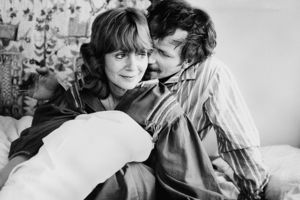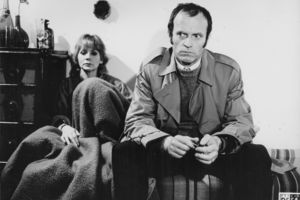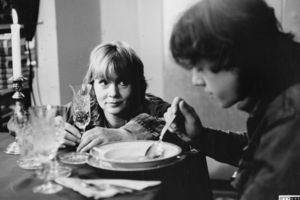Die Beunruhigung
Director: Lothar Warneke, 99 Min., Black-White, Feature Film
Deutsche Demokratische Republik (DDR)
DEFA-Studio für Spielfilme, 1981
- Film/Video Format
- 35 mm
- Length in m
- 2717
- English Title
- Apprehension
- Premiere Date
- Release Date (for Cinema)
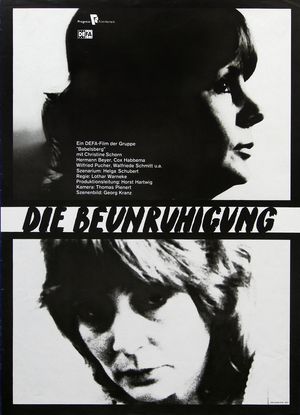
(Dir.: Lothar Warneke, 1981) Graphic Design: Marlies Schlegel
Short Summary (English)
The psychologist Inge Herold is in her middle thirties, divorced, has a fifteen-year-old son and a relationship with a married man. When she finds out that she may have a malignant tumor in her breast and has to go to the hospital for surgery the next day, a life crisis begins for her. Has she wasted her life? The woman, who is usually so unshakable and likes to be in control, begins to doubt herself. Her life partner is no support to her in this difficult situation...
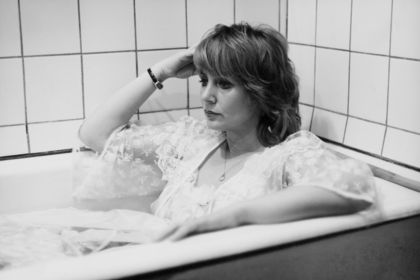
(Dir.: Lothar Warneke, 1981) Photography: Norbert Kuhröber
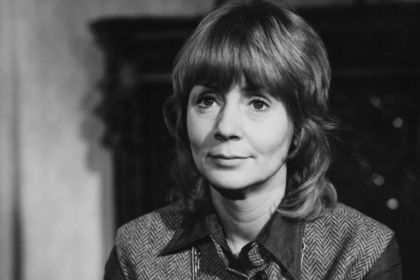
(Dir.: Lothar Warneke, 1981) Photography: Norbert Kuhröber
Film Crew
- Director
-
- Lothar Warneke
- Script
-
- Lothar Warneke
- Scenario
-
- Helga Schubert
- Camera
-
- Thomas Plenert
- Film Editing
-
- Erika Lehmphul
- Cast
-
- Christine Schorn (Inge Herold)
- Hermann Beyer (Dieter Schramm)
- Mike Lepke (Lutz (Mike))
- Lydia Billiet (Mitfahrerin in Straßenbahn)
- Christoph Engel (Ehemann des Ehepaares in der Beratungsstelle)
- Sina Fiedler (Ehefrau des Ehepaares in der Beratungsstelle)
- Cox Habbema (Brigitte)
- Jörg Herrmann (Fürsorger)
- Jarmila Karlovská (Ältere Frau)
- Ostara Körner (Ältere Frau in Beratungsstelle)
- Bärbel Loeper (Junge Frau)
- Wilfried Pucher (Joachim)
- Horst Röseler (Arzt in Geschwulstklinik)
- Traute Sense (Inges Mutter)
- Helmut Schlegel (Psychiater)
- Walfriede Schmitt (Richterin Katharina)
- Steffie Spira (Ältere Dame im Café)
- Ilka Wendel (Sekräterin von Inge)
- Susanne Funk (Ines, Dieters Tochter)
- Andreas Pietsch (Freund von Lutz)
- Thomas Brunke (Freund von Lutz)
- Thomas Warneke (Freund von Lutz)
- Ines Golze (Freundin von Lutz)
- Claudia Soyke (Freundin von Lutz)
- Dagmar Ebbecke (Freundin von Lutz)
- Assistant Director
-
- Christiane Plöger
- Assistant Camera
-
- Dieter Lück
- Norbert Kuhröber
- Production Design
-
- Georg Kranz
- Script Editing
-
- Erika Richter
- Music
-
- César Franck (Präludium und Fuge h-moll opus 18)
- Sound
-
- Bernd-Dieter Hennig
- Gerhard Ribbeck
- Costume Design
-
- Christiane Dorst
- Ruth Leitzmann
- Herbert Henschel
- Make-Up
-
- Heinz Bernhardt
- Karin Wacker
- Props
-
- Hans-Joachim Bauer
- Production Management
-
- Horst Hartwig
- Unit Production Management
-
- Wolfgang Lange
- Egon Schlarmann
- Rosalinde Schwarzer
- DEFA Photography
-
- Norbert Kuhröber
Awards
- 2. Nationales Spielfilmfestival der DDR Karl-Marx-Stadt (1982): Preis für Kamera - Thomas Plenert
- 2. Nationales Spielfilmfestival der DDR Karl-Marx-Stadt (1982): Preis für Schnitt - Erika Lehmphul
- 2. Nationales Spielfilmfestival der DDR Karl-Marx-Stadt (1982): Preis für Szenarium - Helga Schubert
- 2. Nationales Spielfilmfestival der DDR Karl-Marx-Stadt (1982): Preis für Regie - Lothar Warneke
- 2. Nationales Spielfilmfestival der DDR Karl-Marx-Stadt (1982): Schauspielerpreis für weibliche Hauptrolle - Christine Schorn
- 2. Nationales Spielfilmfestival der DDR Karl-Marx-Stadt (1982): Preis für eine weibliche Nebenrolle - Walfriede Schmitt
- 2. Nationales Spielfilmfestival der DDR Karl-Marx-Stadt (1982): "Großer Steiger" der Publikumsjury für den wirkungsvollsten Film
Short Summary (German)
Die Psychologin Inge Herold ist Mitte 30, geschieden, hat einen 15-jährigen Sohn und ein Verhältnis mit einem verheirateten Mann. Als sie erfährt, dass sie möglicherweise einen bösartigen Tumor in ihrer Brust hat und sich am nächsten Tag zur Operation ins Krankenhaus begeben muss, beginnt für sie eine Lebenskrise. Hat sie ihr Leben vertan? Die sonst so unerschütterliche Frau, die gern die Kontrolle innehat, beginnt zu zweifeln. Ihr Lebenspartner ist ihr in dieser schwierigen Situation keine Stütze…
Short Summary (Other Languages)
Vingt-quatre heures de la vie d'une femme qui attend les résultats d'un examen médical. (Französisch: Cinémathèque française 2003)
Inge Herold lavora come psicologa in un consultorio, dove aiuta coppie di coniugi in crisi. Dopo un controllo medico di routine, Inge si ritrova lei questa volta seduta in sala d'aspetto, dall'altra parte della scrivania, disorientata e in cerca d'aiuto: le è stato diagnosticato un tumore al seno. Questa notizia la getta nello scompiglio, la diagnosi del cancro la avvicina d'un tratto pericolosamente alla morte. Dopo lo shock iniziale, trascorre le ultime ore prima del ricovero in modo per lei insolito. (Italienisch: Goethe-Institut Roma)
Inge Herold mora com o filho adolescente e trabalha como psicóloga em um centro de "aconselhamento matrimonial e familiar". Após uma consulta médica rotineira, ela descobre ter um nódulo no seio e é informada de que deve remover o tecido e possivelmente o seio afetado. Enquadrada por duas cenas da fase pós-operatória, a história é contada como um longo flashback que mostra come Inge vive o tempo que lhe resta antes da cirurgia. Muita câmera na mão, filmagens em consultórios médicos, escritórios e apartamentos reais, escapando dos estúdios, constroem uma atmosfera de autenticidade para os embates dessa mulher que se considerava emancipada e distante das questões banais do cotidiano. (Portugiesisch: atrás do muro havia cinema: filmes da defa, alemanha oriental 1946-1992)

